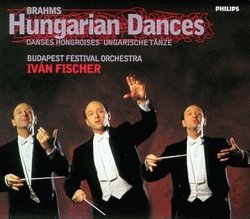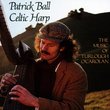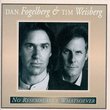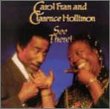| All Artists: Johannes Brahms, Ivan Fischer, Budapest Festival Orchestra Title: Brahms: Hungarian Dances Members Wishing: 0 Total Copies: 0 Label: Philips Release Date: 11/9/1999 Genres: Dance & Electronic, Classical Style: Symphonies Number of Discs: 1 SwapaCD Credits: 1 UPCs: 028946258927, 028946258927 |
Search - Johannes Brahms, Ivan Fischer, Budapest Festival Orchestra :: Brahms: Hungarian Dances
 | Johannes Brahms, Ivan Fischer, Budapest Festival Orchestra Brahms: Hungarian Dances Genres: Dance & Electronic, Classical |
Larger Image |
CD DetailsSimilarly Requested CDs
|
CD ReviewsNot What I Had Hoped For Adaman | Los Angeles, CA | 08/28/2004 (2 out of 5 stars) "I was hoping for a recording full of Gypsy drama and flair. Unfortunately, I did not find it in this recording. It seemed like the musicians were just going through the motions. Also, the sound quality was lacking. It was recorded at a low volume with an almost muddy sound quality. I would have prefered a more crisp sound. I would suggest looking into the other recordings that Amazon has to offer. There are quite a few other versions here that are more enjoyable." Different, but not definitive Aronne | 11/22/2006 (3 out of 5 stars) "At first glance, this seems to be a desirable issue. The back of the case states that this is "A refreshingly new look at one of the most enduring success stories in music history. With partly new orchestral arrangement, bringing the music closer to its Gypsy sources." When I first placed this disk in my CD player, I was a little shocked at what Number Two sounded like--new orchestrations indeed! But one grows accustomed to them. Fischer uses non-traditional orchestration in all but Nos. 1, 3, 10, 16 & 19-21 (although he is liberal with ornamentation in all of them). The orchestrations for 2, 4, 5, 7 & 11-14 are Fisher's own. In the present recording, the changes bring on bulkier textures, and Fischer most often slows down to match. This is most effective in the slower dances, when measured rubato is less noticeable. This recording is also ill-packaged, with far too many disturbing artist photographs (8 photos of Fischer, two much too large, plus three of other artists). Overall, this issue is good, but not the best. One would do well to look into Bogar's Naxos disc, available for much less." Different and loads of fun Wayne A. | Belfast, Northern Ireland | 10/03/2005 (5 out of 5 stars) "To be fair, this is "easy listening" Brahms, the sort of confections the Boston Pops would have served up with plenty of fanfare back in the heady Fiedler days. To be fair, that's pretty much what these pieces are and were always meant to be--pop Brahms. Keep in mind the grizzled old master loved Strauss (waltz king fellow) and turned up at his shows as often as possible. Picture Brahms with a stogie, a stein of beer, and a big grin. Imagine Strauss playing these at a concert. That's what this music sounds like.
So, the big belly-ache is that these don't sound like every other version, especially since extra real-deal Gypsy instruments have been tossed in, arrangements are much more folksy, and Fischer takes kookie Eastern European liberties with tempo and expressiveness. Oh well. Give Fischer credit for challenging traditions at a spot where a challenge is not only welcome but totally legitimate--these are arrangements to begin with for Pete's sake! Worry if Fischer does this with, say, Mahler (although that might be refreshing). Also, i see some complaints about sound quality. Philips gave these a nice natural sound, a pinch lush, but not overtly punchy. Very lovely to listen to. Sometimes reviewers need to check their cables or clean the switches. To the joy of some (like me) Brahms is being dusted off and reconsidered. We're finally hearing detailed performances of the symphonies that make clear the gulf between Johannes and Tchaikovsky. Some of these newer recordings enable one to understand why Arnold Schoenberg thought of Brahms as the beginning of the modern era. Personally I find him totally unique and utterly amazing. Let's get back to seeing him as Beethoven's legitimate heir. " |










